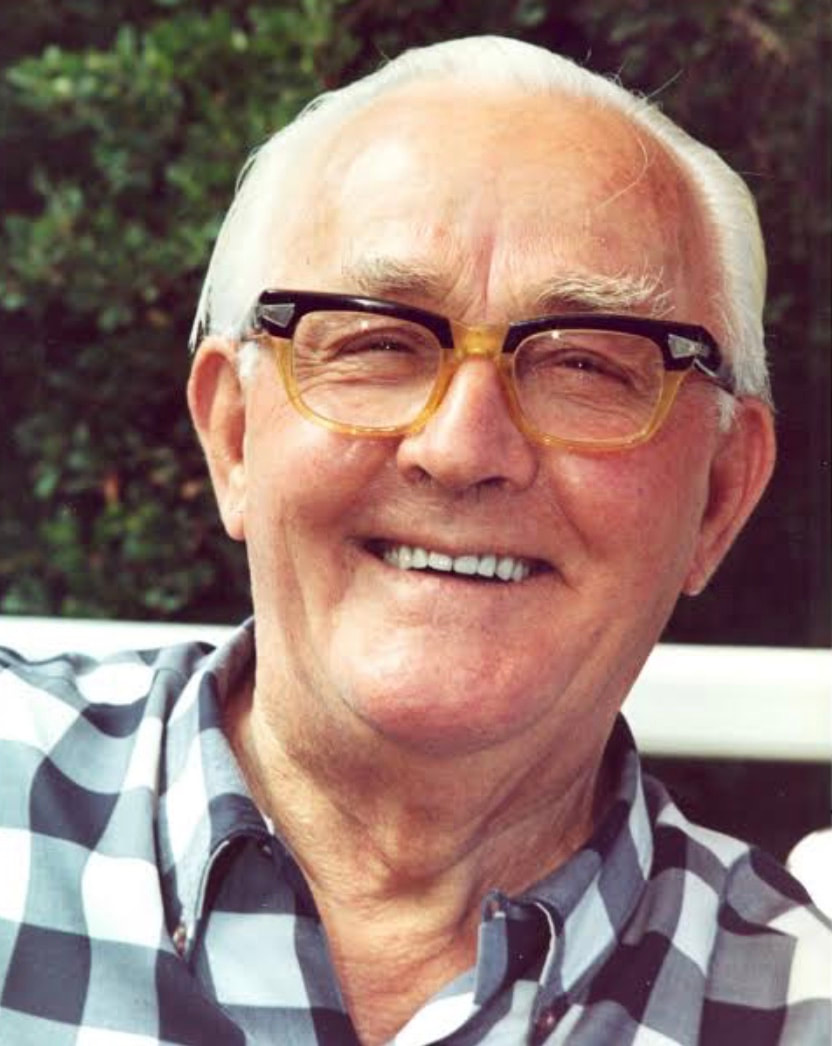|
When some leading American retailers were sent a pair of Australian made pants from a factory in Warrnambool Victoria for testing in 1962, they were appalled. Their considered opinion was that the maker of these Merino wool trousers had got it wrong – they were just too good! They would never wear out and customers would not return. The experts recommended that the maker, Fletcher Jones, study the science of ‘Planned Obsolescence.’ They didn’t know who they were talking to! Fletcher, the son of a Bendigo blacksmith had battled his whole life to do the exact opposite. He spoke proudly of being reared in a struggling Christian household where his father taught him concern for the rights of the workers. He was to treat his fellows as creatures made in God’s image, destined to live and work in creative communities. This bred a life-long conviction never to treat his employees as mere cogs in a machine to make him wealthy. In 1915 Fletcher had limped home from the bloody battle of Fromelles in France a shattered man – his childhood stutter worsened by the shock of being buried alive. But the young ANZAC refused to let either of these traumas chain him to life on a pension. Instead, he determined to overcome them by going on the road as a travelling salesman!
As the tough post-war years spiralled down into the Great Depression of 1929, Fletcher was testing his idea of putting people before profits in his fledgling clothing business. He had the radical belief that the ones who made the products should benefit directly, not just outside shareholders. Their participation in decision-making was far more important for job satisfaction and for boosting productivity. He was ahead of his time when he gave women equal pay and the right to buy shares in the factory. His guiding principle was even more extreme - a company failed its employees if it could not help them express their spiritual growth through their jobs. In this he had a unique mentor – a Japanese labour activist and Christian reformer Toyohiko Kagawa - who had dedicated himself to ordering Japanese society based on the radical principles taught by Jesus. He lived among the poor doing all he could to improve their lives. Fletcher did the same, living in a simple two room cottage, even when his business became one of the largest clothing manufacturers in the world, with almost three thousand staff employed in four factories and thirty-three stores spread across every Australian State. He was a man who lived out his axiom; “What you say whispers. What you do thunders.” He embodied the challenge Jesus had given the slave-driven Roman Empire about work practices that elevated people. In effect he was asking Australians to see that their cherished ideas of giving everyone ‘a fair go’ and ‘genuine mateship’ had their roots in these ancient teachings. When WW2 accelerated the demand for Fletcher Jones’ hard-wearing trousers, he seized the opportunity to realise his dream of designing a production company with heart. In 1947, he approached solicitor Neil Symons to help in setting up the business structure for his profit-sharing company. Symons told him, "You don't need a business advisor, you need a psychiatrist!" However, the dream to establish a bridgehead between capitalism and socialism was so infectious, not only did he set up the new business - he left his job to join it. The post-war community in Warnambool looked on sceptically when Fletcher sited old military huts in a former tip at the bottom of a quarry. They christened the factory ‘Shanty Town’. He set about transforming it into a showpiece garden purposed for recreation for his workers. His delight in the success of his alternative model showed. "The acres surrounding our Pleasant Hill factory are a source of much pleasing comment and thousands of traveller photographs. The effect which such an environment has on quality production is inestimable and expressed in terms of our daily production, the cost is infinitesimal." What made Fletcher unique as an entrepreneur was his ability to keep up with the inventive production techniques of capitalist industry and at the same time stay true to his promise of giving those on the shop floor a sense of ownership. Gradually, he turned his growing business over to his workers. To start with, he gave them a third of the stock, but eventually they owned over two-thirds! In the face of the cynical recommendation for Planned Obsolescence, Fletcher and his team of craftsmen and women combined to build a highly successful co-operative based on Planned Durability. They maintained, “Our faith will stay with very top quality.” In the present throw-away society, the concept of owning garments that would survive a lifetime seems all the more remarkable. Fletcher’s boast was, "They never wore out, and you got lifelong adjustments with them." The experiment lasted 50 years and won the loyalty of generations of Australians, many of whom still proudly display immaculate FJ-styled clothing decades old. However, the real value of the house that Fletcher built was in the people. His staff uniformly recalled their boss’s personal interest in his team, addressing them by name when he stopped to ask - "Are you happy? How do you think we could make this place better for you and for the company?" Richard Phillips report about his father tells the story. “Dad had the utmost respect for FJ who was a deeply humane figure - something very rare then and now in the tough, cut throat world of clothing manufacturing. He was very proud to have worked for FJ’s. He was always keen to tell us about each new advance being made by the company and he was deeply appreciative of the friends he made there and the economic security it provided our family.”
2 Comments
Geoffrey Bullock
3/10/2024 09:58:53 pm
Another fine reminder of the good that comes from God!
Reply
Chris Gilbert
3/11/2024 09:03:12 am
This further proves the need for fossicking our history. And urging writers and scriptwriters to get busy about helping us all imagine what could be, instead of surrendering to the dark scenarios of so many streaming services.
Reply
Leave a Reply. |
AuthorJoin The Outback Historian, Paul Roe, on an unforgettable journey into Australia's Past as he follows the footprints of the Master Storyteller and uncovers unknown treasures of the nation. Archives
October 2023
Categories
All
|
|
Sponsored by
|
Privacy Policy
|
|
Copyright 2020 by The Outback Historian
|
Site powered by ABRACADABRA Learning
|



 RSS Feed
RSS Feed

